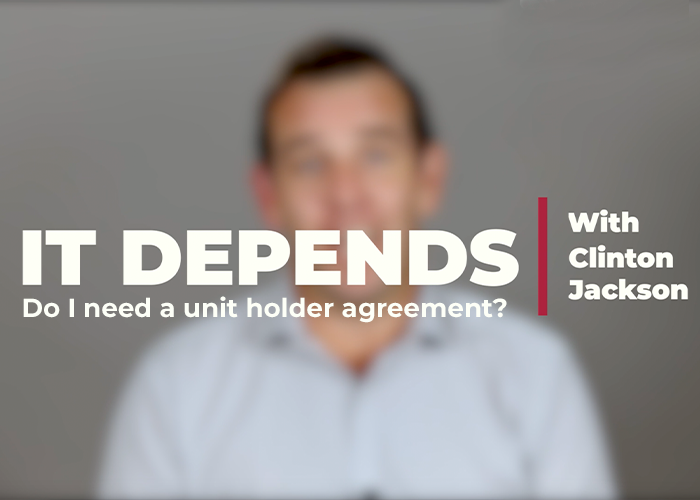In this edition of ‘It depends’, partner Clinton Jackson talks about what a unitholder agreement is and whether you need to have one.
Video transcript
Welcome to this edition of It Depends. Today we’re talking about whether you need to have a unitholders agreement.
What is a unitholders agreement?
A unitholders agreement is a governing document that sets out the rules that operate between the unitholders of a unit trust and the actual operations of that unit trust.
How is a unitholders agreement different to the trust deed?
The trust deed for a unit trust often sets out the main rules for the operation of that trust. However, most unit trust deeds are fairly generic and only deal with the key high-level issues for that unit trust. A unitholders agreement on the other hand, is much more comprehensive and deals with interactions between unitholders, in relation to that unit trust.
What should I include in my unitholders agreement?
It depends. What you need to include in your unitholders agreement is going to be different to the next person. The circumstances between the unitholders and the type of investment being undertaken by your unit trust will be different to someone else’s. As a result, a unitholders agreement should be tailored to your specific needs. However, there are some really key issues that should be covered off in every discussion about a unitholders agreement. They include the entry of unitholders into a unit trust and the exit of unitholders out of that unit trust. It’s also critical that when looking at the exit of unitholders we deal with if a unitholder dies or suffers from total and permanent disablement. There are some other key issues that do need to be covered off in the unitholders agreement, such as how decisions will be made. For example, who gets to appoint themselves as trustees or directors of the trustee company? What decisions those directors or trustees are authorised to make without consulting with the unitholders and then the special reserve decisions that should be reserved to a unitholder vote. It’s also important that we cover off on valuation issues because that is often a sticking point between unitholders on the entry or exit of a person.
Do I need a unitholders agreement?
We highly recommend that every unit trusts and the unitholders that are invested in that unit trust have a unitholders agreement. Although the trust deed will set out the basic rules for governing that trust, it will often be lacking in the important detail that’s needed, particularly if the unitholders are not on the same path or not seeing eye to eye in the future. A unitholders agreement will set out a much more comprehensive set of rules for how those unitholders should interact with each other and how key decisions will be made in relation to that unit trust. For that reason, as a unitholder in a trust, you will have much more protection if you enter into a comprehensive unitholders agreement. If you’d like to talk about unitholders agreements or whether you need one in your particular circumstances, please contact a member of our team.





